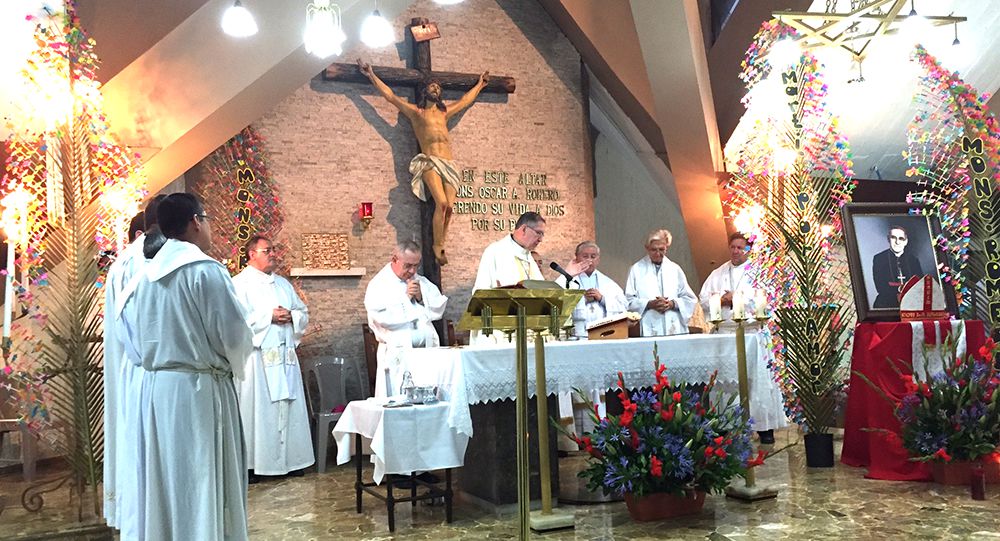The sanctuary in La Divina Providencia Hospital Chapel in San Salvador reminded me at once of being present at the site of Jesus’ crucifixion in Jerusalem. There is something very sacred about being present where innocent blood has been shed.
While in San Salvador, El Salvador, for the beatification of Archbishop Oscar Romero, former archbishop of San Salvador, I was privileged to celebrate Mass in the chapel and at the altar where he was shot and killed March 24, 1980 while he was celebrating Mass.
The chapel remains as it was 35 years ago, except for the addition of some of his sayings and his photo. But one senses his presence everywhere.
There is a constant stream of pilgrims who come through the chapel all day long. When people realized that a Mass was going to be celebrated, the pilgrims remained and filled the entire space — spilling over into the aisles and outside. A few other bishops and priests joined me at the altar for the Mass.
The daily Scriptures were powerful and appropriate. The first was from the Acts of the Apostles in which Paul was being accused of many false charges and was held in custody to be sent to Rome for adjudication. That experience of being falsely accused and blamed fell upon Archbishop Romero so often during his three years in San Salvador as Archbishop —1977 to 1980.
In fact, those charges would lead to the orders given to have him shot and killed. The Gospel was from John’s account following the Resurrection when Jesus encounters Peter on the shore and questions him: “Simon, son of John, do you love me more than these?” To which Peter responded, “Yes, Lord, you know that I love you.”
Jesus said to him, “Feed my lambs.” All three questions lead to feed my lambs, tend my sheep, feed my sheep — all pastoral actions carried out heroically by Archbishop Romero in his defense of the poorest members of El Salvador who were suffering under great oppression, government intimidation, military and police brutality, and deep seated fears.
Many Salvadorans living in Los Angeles had to flee the country back in the 1980s because of the fears, death squads, becoming a “desaparecido” [one who disappears in the night], and constant intimidation. All efforts to achieve social and economic justice for the poorest in the country were seen as anti-government and had to be crushed at every turn.
A small country of six million people became a prison and death camp for countless numbers.
Archbishop Romero stood tall proclaiming the Gospel of Jesus and advocating for basic respect and dignity of all Salvadorans, especially the poor, the farmworkers, and the oppressed.
While beginning the offertory of the Mass at this altar in this chapel, he was shot and killed by a sniper standing outside the chapel entrance. To this day, no one has been arrested, charged, or convicted of killing him — highlighting the deep reach of the government and military in Salvadoran society in those years.
As I began the offertory, I paused and looked down the aisle towards the front door. But instead of a sniper, I saw families, children and pilgrims yearning to be a part of this place and this Mass.
While Salvadoran society still has far to go in extending rights and opportunities fully to all its people, much has been accomplished through the heroic faith, preaching and teaching of Archbishop Romero. As he remarked during his life: “If they kill me, then through my blood the people of El Salvador will arise.” And it is happening.
Near the Hospital Chapel, the University of Central America — popularly known as UCA — still exists and is led by the Jesuit Community. In the dark of night, six of their priests were taken out of their rooms at the university and shot on the lawn.
A housekeeper and her daughter were shot as well since the soldiers thought they could be identified if the two lived. All this happened on Nov. 16, 1989, nine years after the archbishop’s death, signaling the continuing unrest and threats.
But the blood of martyrs has always signaled a new rising to new life and new opportunity. The evil of killing others never triumphs.
Right behind the altar is an artistic font in Spanish: “En este altar Mons. Oscar A. Romero ofrendo su vida a Dios por su pueblo.”
“On this Altar, Abp. Oscar A. Romero was offering his life to God for his people.”
He is now Blessed Oscar Romero. May he intercede for all in his country, and for everyone around the world enduring suffering and hardship for freedom, dignity, and justice.

